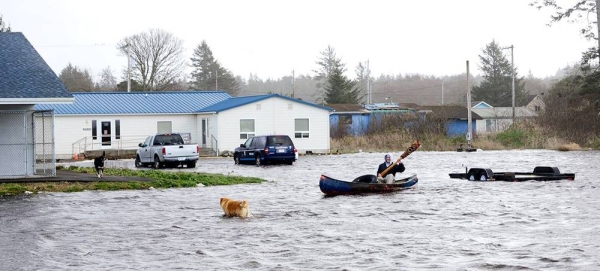
A blanket of thick, snow-like foam covers the surface of a canal in Indonesia’s capital, Jakarta. The froth has exuded from the waters of the east flood canal in Marunda repeatedly over recent years, usually in the rainy season.
Similar pollution has plagued waters in India, including Delhi’s sacred Yamuna River, which has been coated in toxic froth caused by untreated waste, chemicals and pollutants.
In Jakarta, liquid waste, including detergent from homes and nearby factories, has been blamed.
Muhammad Dzikry, 32, an accountant who passes the river on his daily route to the office, said the foamy water was a common sight. “It smells like water waste,” said Dzikry. Despite the river’s dire condition, he could see people fishing from the bank of the water.
The exact cause of the recent foam in Marunda is unclear, said Muharram Atha Rasyadi, an urban campaigner for Greenpeace Indonesia, though the most common contributors to river pollution in Jakarta were household waste and littering.
“During the rainy season, usually waste contamination in the river, like plastic waste, increases due to the higher flow from upstream,” he said.
“We need more and adequate waste water treatment within the city. We also need stronger policy and its implementation to give sanctions for littering.”
The government has previously used netting to trap waste so that it won’t flow out to sea, and deployed teams to pick items from the surface. But pollution of Jakarta’s rivers has been exacerbated by the rise in medical waste such as single-use face masks.
One recent study found a 5% increase in debris found at two river outlets, the Cilincing and Marunda rivers, compared with 2016, partly driven by a recent rise in protective medical equipment, such as masks, gloves and hazard suits.
Jakarta, one of the world’s most densely populated cities with a population of more than 10 million people, struggles with dire air pollution, congested roads, flooding and land subsidence at a rate of 1-15cm per year. The city was recently ranked as the world’s most environmentally vulnerable city by the research firm Verisk Maplecroft, due to its poor air quality and the risk of earthquakes.
President Joko Widodo has proposed moving the capital out of Indonesia’s main island, Java, to East Kalimantan on the island of Borneo. Campaigners have raised concerns over the plan, and warned that, unless the government is committed to green urban planning, the same environmental crises will simply reappear.












